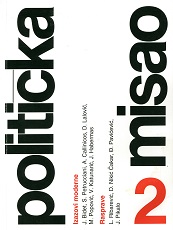EU nije YU – EU je fora: Analiza predreferendumskih televizijskih spotova Vlade RH za ulazak Hrvatske u Europsku uniju
EU is not YU – EU is cool: reading the Croatian government’s pre-referendum videos on the Croatian accession to the EU
Author(s): Zlatan KrajinaSubject(s): Media studies
Published by: Fakultet političkih znanosti u Zagrebu
Keywords: EU; Croatia; Referendum; Television; Video; Propaganda
Summary/Abstract: In this paper I analyse narratives and discourses mobilised in the prime-time videos Croatian Government aired on national television channels prior to the country’s EU referendum, in which citizens were to be informed on the possible advantages and disadvantages of Croatia’s accession to the EU. I adopt a double focus. First, I seek to identify some of the key communicative forms utilised in those videos for purposes of achieving the electoral consent to Croatia’s entrance in the EU. Second, I discuss the significance of those videos for an understanding of Croatian government’s relationship with citizens, that is, for the overall democratic process in which part of sovereignty is to be transferred to the supra-national level. By deconstructing linguistic (audiovisual) dynamics within the featured videos, I identify typical discursive components across the featured videos, that is, the implicit power relation between the producer of the videos (the Government) and the addressees (citizens), as articulated in the thematic consistencies (a systematic absence of the outcomes of EU entry negotiations) and structural patterns (a ‘person in the street’ performs posing a question to the camera and an anonymous voice responds through denial, ridicule or diversion from the posed question) within the analysed videos. My research suggests that the videos served not as information platforms (which they were supposedly designed to be) but as Government’s propaganda. Instead of balanced information on Croatia’s entry to the EU, the Government aired commercially formed advertisements in which it was ‘selling’ the alleged benefits of accession, guaranteed by nothing else but the mere ‘entry’. Instead of demonstrating the results of Croatian negotiations with the EU, the videos told stories about miraculous economic welfares achieved by some of the member states. I contextualise the videos with reference to wider debates on political communications concerning the pre-accession period in some other member states, and to the legacy of authoritarian communications of the elites with the citizens in the specific Croatian context.
Journal: Politička Misao
- Issue Year: L/2013
- Issue No: 02
- Page Range: 98-123
- Page Count: 26
- Language: Croatian

